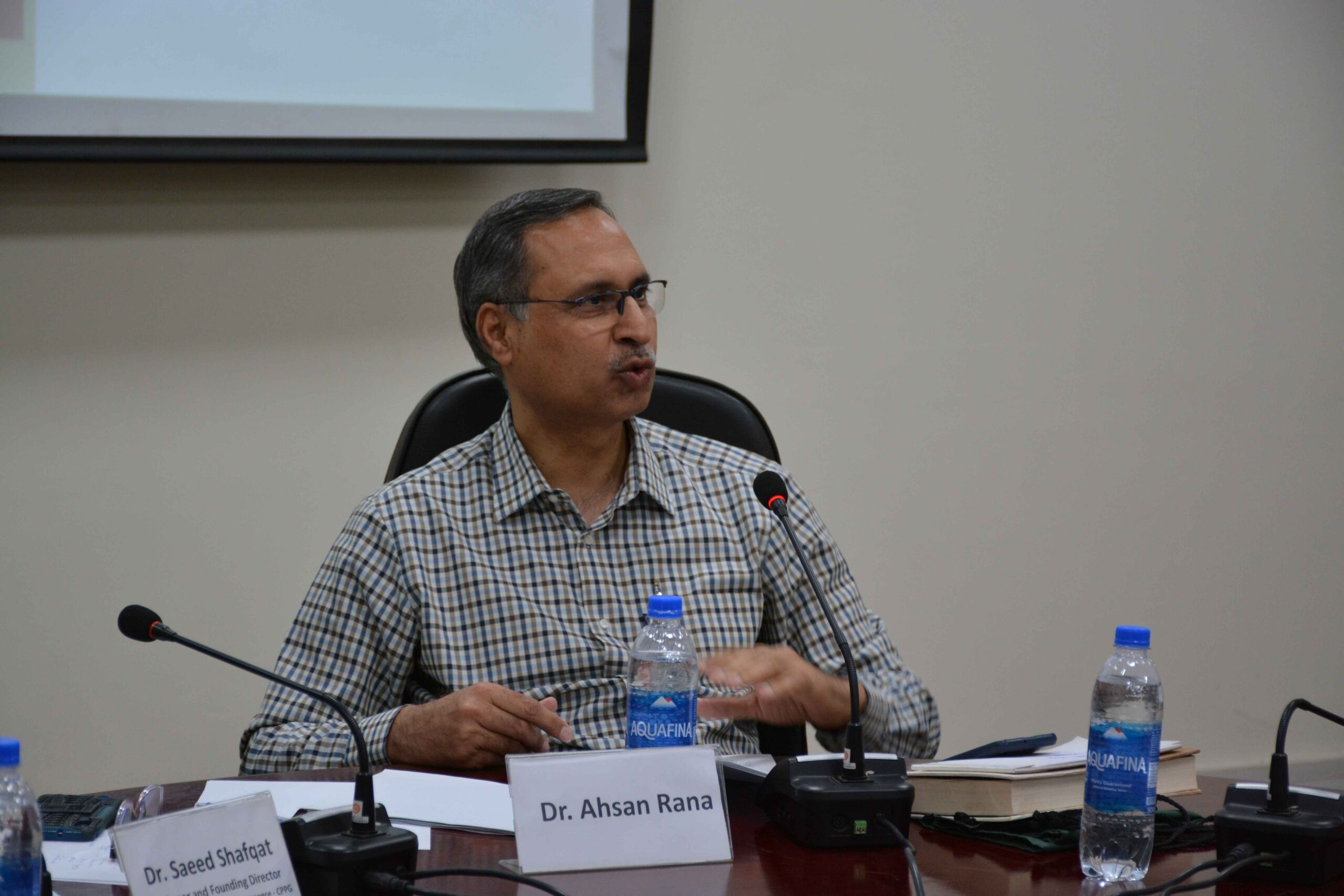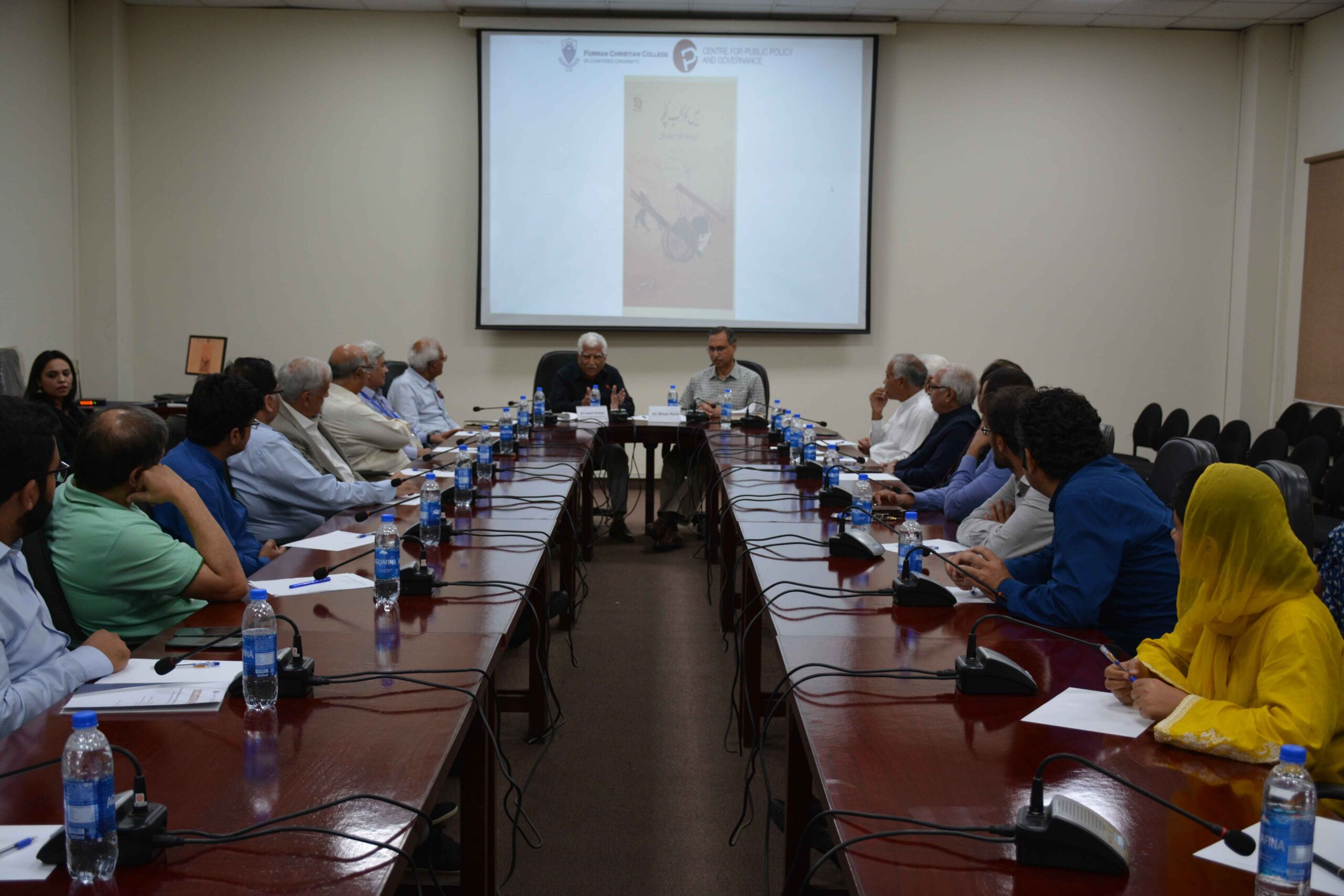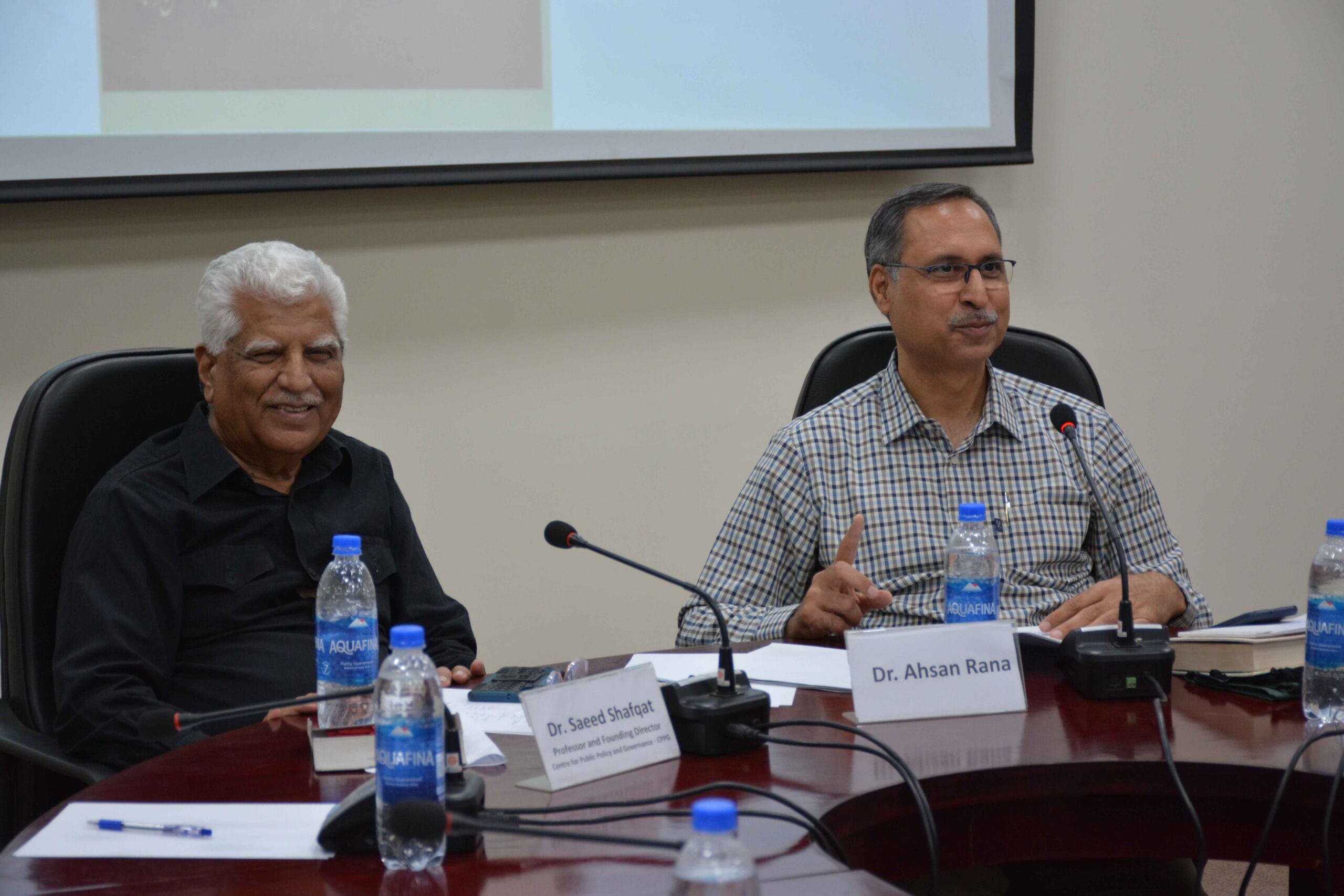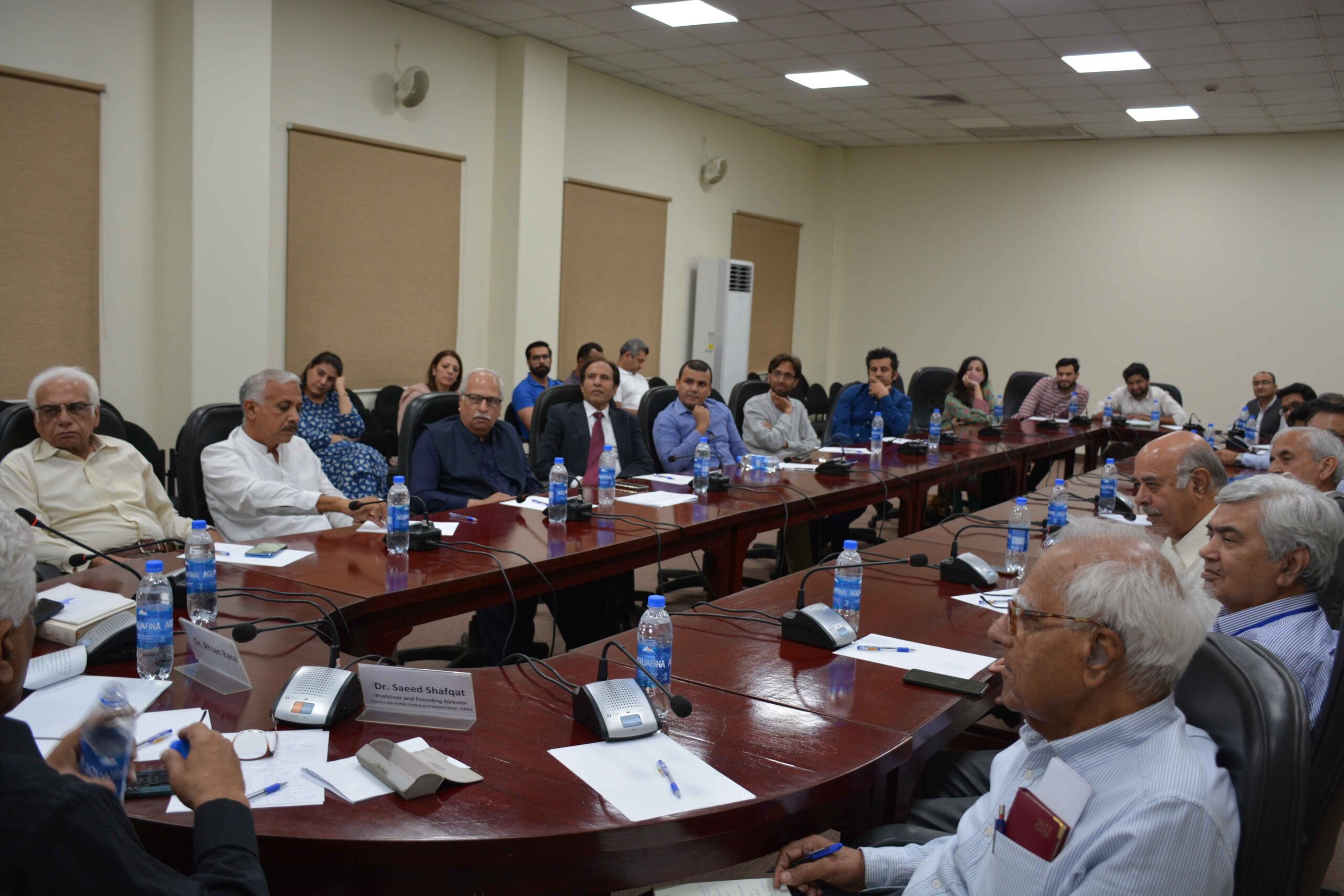
Hain Kawakib Kuch
Book Launch
Past Event
Apr 17, 2024 - 5:00 pm |
Apr 17, 2024 - 7:00 pm
Dr. Muhammad Ahsan Rana
E-002 CPPG FCCU
Upcoming Event
On Wednesday, April 17th, 2024, CPPG organized the book launch of “Hain Kawakib Kuch” authored by Dr. Muhammad Ahsan Rana, Associate Professor of Social Policy at LUMS and the former Director of the Centre for Governance and Public Policy at LUMS. He holds a PhD from the University of Melbourne in Development Studies. His core areas of expertise are social policy, agricultural policy, and public sector governance. He has and continues to work with international organizations such as ILO, USAID, Crown Agents, CIDA, JBS International, the World Bank, and IFPRI.
Dr. Rana initiated the discussion by acknowledging the challenges of publishing a book on political economy in his native language. However, he shared that he was pleasantly surprised to see his idea being received well in academia. The reason for taking this step was solely to make the content accessible to a larger audience. Delving into the content side, Rana shared that his book focuses on Welfare Capitalism. He highlighted that both these terms share a complicated relationship as they both contradict as well as compliment each other. Capitalism, driven by profit-making and competition, stands in contrast to welfare, which emphasizes on distribution, empathy, and cooperation. Yet, capitalist structures create an environment where welfare measures can be implemented.
However, Rana remarked that welfare steps often lead to a fiscal crisis. Citing the example of the Benazir Income Support program, launched in 2008, with an initial expenditure of 0.2 billion dollars. The program aimed at poverty alleviation and providing support to the poor strata of society. Whereas the program has not been able to achieve its objectives, its budget has significantly increased over time. It is quite surprising that even amidst fiscal deficits, Pakistan allocated 21 billion dollars to the program in 2023.
Rana further elaborated on the two central inquiries in the book. One focuses on the persistence of large expenditures on welfare by the state despite the current state of fiscal deficit. Second, the relationship of welfare programs with the structure of Pakistan’s economy and overall society.
Answering these questions, Rana stated that welfare entails two things. Firstly, it does not involve small changes rather it aims at bringing bigger changes, and for that, it requires large expenditures. Pakistan, for instance, has allocated a staggering 3,000 billion rupees to welfare, amounting to 38 percent of its total revenue. Secondly, welfare provisions extend beyond the poor strata of society, providing benefits to the non-poor sections as well. For example, the government employees in Pakistan enjoy pensions without contributing anything to it. An average low-grade pensioner is receiving nine percent more income than 40 percent of Pakistan’s population. Moreover, 63 percent pension is given to those having a grade above 14. Additionally, tax breaks are extended to different well-off segments of society like the judiciary, bureaucracy, academia, etc. Moreover, subsidies do not cater only to the impoverished rather they are enjoyed by all members of the society. These examples imply that welfare measures often favor non-poor demographics over the impoverished.
In addition, Rana highlighted the necessity of scrutinizing tax collection mechanisms and its beneficiaries. He argued that welfare funds are not collected through elite taxation rather it is taken from the entire population. Citing a UNDP report in 2020, he revealed that 80 percent of the population, including the bottom 40 percent and those marginally above the poverty line, contribute over 50% of the total taxes. Since the government has other means of collection as well, in the form of sales tax, the bottom four quintiles are giving almost 57 percent taxes. Highlighting this, Rana questioned the absence of property taxes on the affluent.
Turning to international welfare mechanisms, Rana shared that many countries collect welfare money through social insurance while there is no concept of social insurance in Pakistan, consequently, no scheme is devised for it. However, EOBI is a form of it, but, it has a small scale. He further argued that other countries also collect money for providing Supplementary Education Services. In Pakistan, bureaucracy clubs were taxed for giving educational SES in 2011 but it was discontinued after four years. In 1962, worker’s children taxes were also set under the Worker’s Children (Education) Ordinance. According to this ordinance, it is applicable to every employer of an establishment, having more than 10 employees, to pay education CESS at the rate of one hundred rupees per annum for educating the workers’ children. The value, for it, was kept at 100 rupees, and it has not changed till now.
Explaining the types of welfare measures, Rana stated that there are three types of welfare measures. First, in which the worker’s capacity is enhanced as increased productivity of the worker benefits him/her in the form of lesser work time or increased wage. However, in a capitalist system, neither the work hours nor wages have increased. Rather, the rise of real wages are providing benefits to the employer and not to the employee. Secondly, it means an increase in health and social standards of the workers, which is often termed as social wage. However, with large social wages, monetary wages have decreased as subsidies, in essence, provide benefits to the employer. Thirdly, welfare is used to showcase a kind face of the government, especially during times of crisis or floods when the government helps or provides aid to the vulnerable community. Thus, in a capitalist system, the welfare of workers is compromised.
Elucidating structural dynamics in a capitalist productive system, he talked about the concept of primitive accumulation wherein workers are separated from the means of production and are occupied just for labor work. Secondly, Rana argued that the capitalist system is inherently unstable, characterized by recurrent crises stemming from surplus population, production, and capital. Decreasing purchasing power of the working community leads to surplus products further leading to list of chronic problems. To cater to this cycle, government intervenes through subsidies and social programs, whose cost is given by the poor strata of society through taxes.
Moreover, the capitalist system brings up environmental toll in the form of pollution and resource depletion. To reverse these effects, the government has to intervene by employing environmental remediation efforts and waste management initiatives.
As a way forward, Rana advocated for a paradigm shift towards equitable distribution and inclusive participation within production systems. He called for a re-evaluation of the relationship between production and distribution, emphasizing their interconnectedness. He remarked that they are two sides to the same coin. Thus, greater worker involvement in decision-making processes is a must to foster a more just and sustainable economic order.
The session was followed by an interesting Q/A session.




